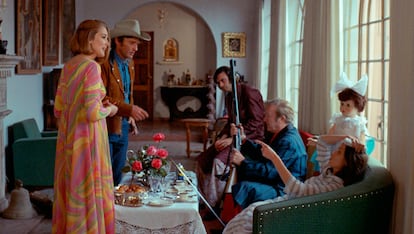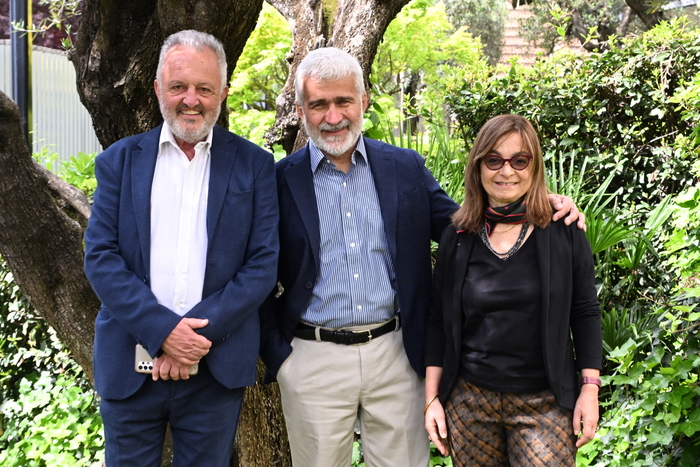To find out where cinephilia is today and what ways we have of approaching cinema in a world in which we can not only choose what we see, but how, when and where we do it, the Cineteca de Matadero Madrid has organized the cycle
Una peli que está very good
,
which proposes a revision of the canon through the projection of some films and the organization of round tables and seminars until the end of April. It is about establishing a base or a starting point to summon new ways of seeing, interpreting and loving cinema. The programmed films are very different from each other, but they share an exercise of doubling by means of which the cinema becomes an observer of itself.
The cycle began with
Rose Hobart (
1936), Joseph Cornell's first film, which consists of a remake of
East of Borneo
, starring five years earlier by the actress who gives the title to Cornell, who adored her. It was screened for the first time in the gallery of Julien Levy, one of the introducers of surrealism in the United States. Also from previous footage has been composed
Phoenix Tapes
(1999), by Christoph Girardet and Matthias Müller, which consists of 45 minutes of rematchings of Alfred Hitchcock films, thus revealing new correspondences and internal symmetries. In the four short films by Martin Arnold included in the program, which loop and sometimes flip a few frames of some classic films, the technical work manages to reveal that the relationships between the characters may not be as idyllic as they seem.
The Last Movie
(1971) Dennis Hopper's second directorial job after
Easy Rider
, it functions as a reverse of the western. Within the film, the conventions of the cinema are considered as a trigger for the action. And it almost became Hopper's last film, which took him 10 years to re-direct.
Irma Vep
, directed in 1996 by Olivier Assayas,
is also organized around a shoot
. Irma Vep is an anagram for
vampire
; A film crew recreates the serial films Louis Feuillade made with Musidora in the 1910s.
James Franco's
The Disaster Artist
recreates the conception and filming of
The Room
, which since its premiere in 2003 and its rise to fame as the worst film in history has rarely been seen without irony.
In
Rewind, Please
, by Michel Gondry, we witness a filming forced by an accident, in an adventure that returns us to the ways of primitive cinema.
An image from 'The Last Movie' (1971), by Dennis Hopper.
That in terms of the filming that sneak into the movies
. Goodbye Dragon Inn
, by Tsai Ming-liang, makes us attend a farewell to a room in Taipei. While the projection of the martial arts film
Dragon Inn
lasts,
a slight plot unfolds in the stalls. The duplicity in
Numéro Deux
(1975), by Jean-Luc Godard and Anne-Marie Miéville, is achieved through the simultaneous and almost constant presence of two image frames on the screen. In this way, the daily coexistence of a married couple with two small children is fractured, in which the woman is trapped. You can also see
I Had Nowhere to Go
by Douglas Gordon, which is based on the autobiography of the same title by filmmaker Jonas Mekas.
The film spends much of the time with the black screen, in which images appear from time to time in the middle of an immersive soundtrack.
From past to future
So far the cinephile nostalgia and mythomania that is shedding the skin. The activities that make up the cycle revolve around the review of these and other films, and focus on the weekend of April 23 and 24. The architect and writer Vicente Monroy will hold a conversation about the current approach to cinema, the burden that creeps in from the past and possible future trends, topics covered in his 2020 essay
Against cinephilia
. Video essayist Kevin B. Lee will base his workshop /
masterclass
, focused on rethinking criticism in audiovisual terms, on the films screened in the cycle.
Insult!
it's a
performance
of expanded criticism by the programmer and filmmaker Lucía Salas, who proposes the opening of cinephilia to feminism through the transformation of the viewing experience. Starting from Ida Lupino's films, she will investigate the relationship of women with space and their presence in the public sphere.
Finally, the seminar closes with the ACAB (All Cinephiles Are Boring) session, organized by the members of the weekly program of screenings and conversations CineZeta.
It will consist of a colloquium between four young filmmakers and researchers: Noah Benalal, Pablo Caldera, Celia Dosal and Jesús Choya.
Each one will propose a new definition of cinephilia and an exhibition of the new rituals around cinema, beyond the cinemas.
Other ways of making, distributing and projecting have generated new audiences and the figure of the traditional spectator is not enough to assimilate them.
Also cinephilia must change skin.
A movie that is very good
.
Cineteca.
Matadero Madrid.
Until April 29.
You can follow BABELIA on
and
, or sign up here to receive
our weekly newsletter
.



/cloudfront-eu-central-1.images.arcpublishing.com/prisa/73ZHZSDVHRBJTPHOJJXPCVYFA4.jpg)






